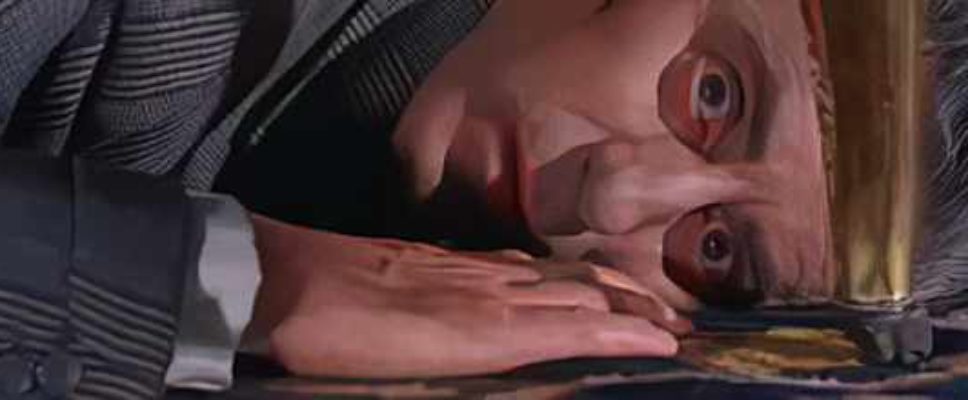Teresa Reviews “The Spider’s Web” (1960)
Fidelity to text: 4 1/2 blunt objects.
![]() It’s a virtually line-for-line reenactment of the play, other than Pippa being nearly suffocated by the murderer.
It’s a virtually line-for-line reenactment of the play, other than Pippa being nearly suffocated by the murderer.
Quality of movie on its own: 4 blunt objects.
![]() Funny, frothy, ridiculous, and as light as air. If you can accept the very stagy sets and the odd, often incongruous music, you’ll enjoy this bit of murderous fluff.
Funny, frothy, ridiculous, and as light as air. If you can accept the very stagy sets and the odd, often incongruous music, you’ll enjoy this bit of murderous fluff.

The Spider’s Web is a homicidal I Love Lucy episode. Glynis Johns portrays Lucy Ricardo, but since this is British, she’s named Clarissa Hailsham-Brown. Long-suffering husband Ricky is renamed Henry Hailsham-Brown. The cartoon opening and closing credits with criminal flies and irritated spider policemen set the tone. The spritely, buoyant, sometimes jarringly unsuitable music adds to the skewed atmosphere. The very stagy backgrounds finish off the otherworldly sense of everything being off about 37 degrees. Some of the walls are obviously painted sets and not real walls with real paintings, like you expect in a movie. You’ll keep thinking you entered a parallel dimension.
The stage design is probably offbeat because Spider’s Web was originally a play Agatha wrote in 1954. It enjoyed several successful theatrical runs, and Charles Osborne novelized it in 2001.
If, dear reader, parts of the plot seem familiar, that’s because they are. Agatha reworked four plot points from earlier properties:
* The first was lifted from the Poirot short story “The Adventure of the Cheap Flat” (1924): The Hailsham-Browns rent the fully furnished Copplestone Court for a song because they have the necessary last name.
* The treasure everyone is searching for but doesn’t recognize as valuable is a rare postage stamp on an envelope containing other papers of interest. This plot point dates back to “The Case of the Buried Treasure” (1941), a Miss Marple short story.
* Pippa believes she’s guilty of murder via her voodoo experiments. That tidbit came from the Poirot novel, Evil Under the Sun (1941).

Clarissa Hailsham-Brown’s vivid supposings and overactive imagination is completely new. Agatha does like using her repertory company of stock characters, putting them in various situations and making them jump on command, but she never wrote anyone quite like Clarissa. Loopy, zany, sexy, adored by her amused husband, Clarissa doesn’t live in the same universe as anyone around her. She is unique. Tuppence comes closest, other than Agatha herself. As the youngest by far of three children, she spent much of her play time “supposing” stories in her head.
In Spider’s Web (the producers added “The” to the film’s title for no discernable reason) Clarissa is faced with a classic I Love Lucy situation. Her dear husband is bringing home — on very short notice — very important people for a high-level diplomatic meeting, and she has to have everything perfect. Meanwhile, there are house guests to amuse, her stepdaughter is practicing voodoo, it’s the butler and cook’s night out, and the gardener has been conducting open warfare with them. As an added irritation, the household has been receiving mysterious phone calls.
Could things get worse? Sure they could.

Clarissa, fearing that Henry will show up at any moment with the VIPs, gets the gardener to show Oliver the door. With the house empty, she races around doing last-minute tidying and discovers Oliver’s dead body behind the sofa. What to do, what to do. As she’s panicking, Pippa enters the room, sees the body, and announces that she murdered Oliver. Clarissa doesn’t ask Pippa how she did it. It seems clear enough; his head was bashed in.


 Everyone leaves the room, the coroner is called in, and when the coroner arrives, the body has vanished. The coroner is suspicious about the police inspector’s mental state. The police inspector is apoplectic.
Everyone leaves the room, the coroner is called in, and when the coroner arrives, the body has vanished. The coroner is suspicious about the police inspector’s mental state. The police inspector is apoplectic.

This is, I believe, the only time Agatha played with musical bodies. Other people have. Alfred Hitchcock did in The Trouble with Harry (1955). Donald Westlake did in The Busy Body (1966), filmed in 1967. There’s also that cinematic classic Weekend at Bernie’s (1989). But not Agatha. Yet here, in Spider’s Web, she did.
That alone is reason enough to watch this little gem. It has its flaws. It’s stagy. The cameraman must have believed he couldn’t move the camera around and filmed the action as though he was sitting in row 5, seat 17 of the theater. The actors have to make up for the static camera with energy and timing and for the most part, they do. Glynis Johns is a wonder, and if you’ve only seen her as Mrs. Banks in Mary Poppins, you’re in for a treat. The musical score can only be described as weird. It highlights the action but as if everything happening on screen is a comic soufflé of a sitcom and not a murder mystery.
Like Clarissa, The Spider’s Web is unique in the Agatha Christie canon.


